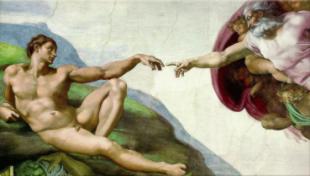Home


The Creation of Adam by Michelangelo Buonarroti
The ability to conceive new concepts and ideas, or to make new associations with existing concepts and ideas
This is basically the ability to come up with something new without having observed it or having someone teach it to you. Incidentally, the definition of genius (at least in its functional form) is the ability to come up with a great concept or idea that is truly original. Now if you have an idea that is truly original, then it obviously was not shown or taught to you. This implies that all works of genius involve creativity in one form or another and that all geniuses are creative. As a result, learning about creativity is crucial if we are to understand geniuses. Conversely, if we wish to understand creativity, then studying the most extreme examples (geniuses and their work) is definitely helpful.
When many people think of creativity, they usually associate it with art, entertainment, or design. However the truth is that all original concepts, regardless of field, involve creativity. Also, creativity can be involved in any field that allows independent thought. For example, when Sir Isaac Newton and Gottfried Leibniz invented Calculus (independently of each other), it was as much a creative breakthrough as it was a mathematical breakthrough. At the time, figuring out the area under a curve by conceptually dividing it up into an infinite number of infinitely narrow rectangles was a totally new idea. Yet this concept basically forms the Fundamental Theorem of Integral Calculus.
Another common belief is that creativity resides strictly on the right side of the brain. But many studies have shown that it really is a coordinated effort between both brain hemispheres. Besides, if the left hemisphere (the side that deals with words) had no role in creativity, then the poets would be out of business.
Many people also believe that you are either creative or you are not, and that there is nothing that you can do about it. This viewpoint is understandable but we cannot be so sure of its accuracy, especially after considering the following:
1. It was commonly accepted that the ability to draw was innate and not something that could be learned. Dr. Betty Edwards disproved that when she showed (with actual students) that drawing realistically is a learnable skill, and by explaining the science in her book titled Drawing on the Right Side of the Brain.
2. Contrary to long held beliefs, the human brain can generate more neurons and make new connections under the right conditions. There is a real possibility that this can affect the person's creativity.
3. When you look at the traits of creative people, they usually include the following:


The Creation of Adam by Michelangelo Buonarroti
Creativity in General
If you seek the definition of creativity, you will probably get many different responses which essentially mean the following:The ability to conceive new concepts and ideas, or to make new associations with existing concepts and ideas
This is basically the ability to come up with something new without having observed it or having someone teach it to you. Incidentally, the definition of genius (at least in its functional form) is the ability to come up with a great concept or idea that is truly original. Now if you have an idea that is truly original, then it obviously was not shown or taught to you. This implies that all works of genius involve creativity in one form or another and that all geniuses are creative. As a result, learning about creativity is crucial if we are to understand geniuses. Conversely, if we wish to understand creativity, then studying the most extreme examples (geniuses and their work) is definitely helpful.
When many people think of creativity, they usually associate it with art, entertainment, or design. However the truth is that all original concepts, regardless of field, involve creativity. Also, creativity can be involved in any field that allows independent thought. For example, when Sir Isaac Newton and Gottfried Leibniz invented Calculus (independently of each other), it was as much a creative breakthrough as it was a mathematical breakthrough. At the time, figuring out the area under a curve by conceptually dividing it up into an infinite number of infinitely narrow rectangles was a totally new idea. Yet this concept basically forms the Fundamental Theorem of Integral Calculus.
Another common belief is that creativity resides strictly on the right side of the brain. But many studies have shown that it really is a coordinated effort between both brain hemispheres. Besides, if the left hemisphere (the side that deals with words) had no role in creativity, then the poets would be out of business.
Many people also believe that you are either creative or you are not, and that there is nothing that you can do about it. This viewpoint is understandable but we cannot be so sure of its accuracy, especially after considering the following:
1. It was commonly accepted that the ability to draw was innate and not something that could be learned. Dr. Betty Edwards disproved that when she showed (with actual students) that drawing realistically is a learnable skill, and by explaining the science in her book titled Drawing on the Right Side of the Brain.
2. Contrary to long held beliefs, the human brain can generate more neurons and make new connections under the right conditions. There is a real possibility that this can affect the person's creativity.
3. When you look at the traits of creative people, they usually include the following:
- They are willing to take risks.
- They are always trying to find order in the chaos.
- They see solving the problem as being its own reward.
- They are interested in unusual problems and solutions.
- They accept and trust their own intuition.
- They continually strive to know more about their areas of interest.

